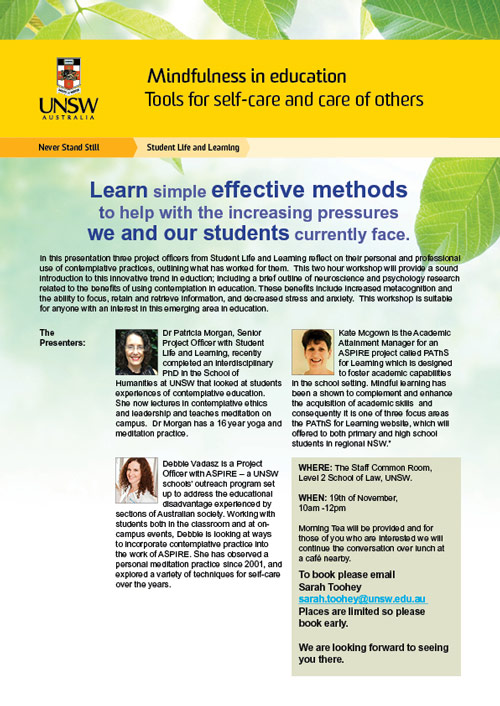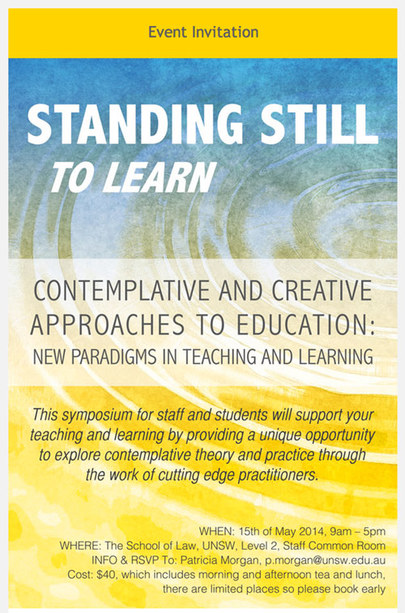Services
Teaching, Research, Presentations and Workshops
Through the Contemplative Academy I offer mentoring, teaching, research, lectures and workshops in Contemplative Education, and design for the application of institution-wide contemplative orientations. I combine experience from my long standing contemplative practice with knowledge gained from the three stages of my career as a working artist, community developer and contract researcher, and academic. Across the course of these three stages I have developed substantial interpersonal and communication skills working with a diverse range of people in varied teams and settings. I bring these experiences plus a commitment to empathetic and open communication and the development of holistic approaches that recognize the place of subjective, embodied, affective, intersubjective and transcendent ways of knowing in education and all human endeavors. What follows is a brief overview of my teaching and research experience gained over the past 32 years.
Teaching
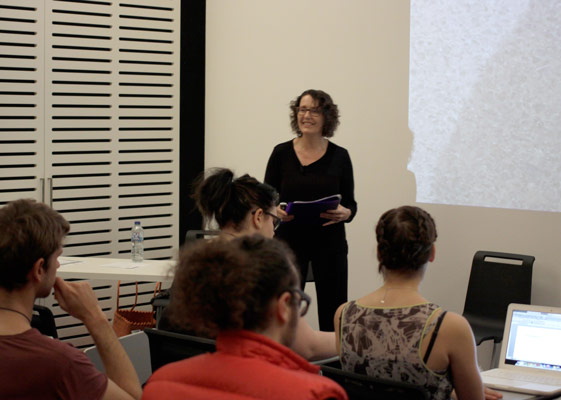
I have taught in diverse settings including government work schemes with students wanting to enter the workforce, on a variety of workshops including those with adults interested in contemplative studies, with primary school students in a creative arts program, design students in Creative Process at Massey University’s Design School, in drug and alcohol rehabilitation centers, with marginalized groups at risk of HIV in Papua New Guinea (PNG) and most recently in the tertiary sector in Australia.
I have conducted research, lectured and taught in the tertiary sector on the Core Curriculum in the School of Theology and Philosophy, ACU; Social Science and Policy Case Studies in Practice in the School of Social Science and International Studies (SSIS), UNSW; lectured on The Resilient Law Student: Theory and Practice, Contemplative Approaches, UNSW School of Law, UNSW; facilitated and presented workshops on Mindful Leadership for Student Life and Learning, UNSW taught in the University Orientation and Study Skills (UOSS) program at the Learning Centre, UNSW; Social Science and Policy, SSIS, UNSW, Sydney; Learning and Transformation, School of Education, University of Western Sydney (UWS); Peer Writing, The Learning Center, UNSW; taught and lectured in Society Environmental Policy and Sustainability, Philosophy of Science, School of Humanities, UNSW.
I have conducted research, lectured and taught in the tertiary sector on the Core Curriculum in the School of Theology and Philosophy, ACU; Social Science and Policy Case Studies in Practice in the School of Social Science and International Studies (SSIS), UNSW; lectured on The Resilient Law Student: Theory and Practice, Contemplative Approaches, UNSW School of Law, UNSW; facilitated and presented workshops on Mindful Leadership for Student Life and Learning, UNSW taught in the University Orientation and Study Skills (UOSS) program at the Learning Centre, UNSW; Social Science and Policy, SSIS, UNSW, Sydney; Learning and Transformation, School of Education, University of Western Sydney (UWS); Peer Writing, The Learning Center, UNSW; taught and lectured in Society Environmental Policy and Sustainability, Philosophy of Science, School of Humanities, UNSW.
From 1999 – 2007 I developed, facilitated and managed educational community arts and sexual health programs teaching individuals recovering from drug and alcohol dependency, mental and physical ill health, and those marginalized by poverty, gender and HIV status.
From 1983 – 1990 I taught art and design across a range of formal and informal settings including Massey University’s School of Design, Wellington, Labor Department work schemes and art classes for children and young adults.
Research
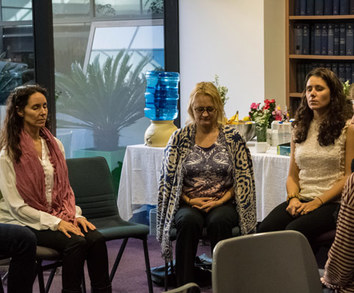
I have conducted contract and academic research working for a number of organizations ranging from the Mental Health Foundation of New Zealand, where I examined the potential of creative arts as a medium for mental health promotion (http://www.mentalhealth.org.nz/get-help/resources/search/?topic=20&topic_only= 1) - to research on Mindful Leadership for the Office of Student Life and Learning, UNSW. Currently I research in the area of work/life balance and the ways this is impacted by Information Communication Technology (ICT). I also continue research and writing in contemplative education and studies, and my publications range across the history of contemporary contemplative education, the ground-of-being experience in contemplative education, contemplative law, contemplative methodologies, second-person or intersubjective experience in education, and most recently contemplative practice in mathematics education. In 2015 I was awarded a contemplative fellowship at the Mind and Life Institute, Massachusetts, USA, where I researched contemplative methodologies.
Attached below are my PhD thesis "Learning Feelings: Foundations of Contemplative Education" and my articles: “Following contemplative education students’ transformation through their ‘ground-of-being’ experiences” and “A brief history of the current reemergence of contemplative education”
Attached below are my PhD thesis "Learning Feelings: Foundations of Contemplative Education" and my articles: “Following contemplative education students’ transformation through their ‘ground-of-being’ experiences” and “A brief history of the current reemergence of contemplative education”
My Publications:
| PhD thesis.Foundations Contemplative Education.pdf | |
| File Size: | 3744 kb |
| File Type: | |
|
| ||||||||||||
My Research Skills:
- Conducted qualitative and mixed methods research and developed new approaches to multi-level coding.
- Performed textual research in comparative religion, contemplative, transformative and integral education, contemplative studies and sciences, neuroscience, psychology and meditation research, practice learning, social practice, phenomenology, embodied learning and cognition, consciousness studies, classical yoga philosophy and interdisciplines surrounding these areas including mindful leadership and contemplative ethics.
- Developed literature reviews and contributed to research design and methodology.
- Attended and contributed to design meetings with co-researchers plus research management across a range of research projects, including time management, development of methods and allocation of project roles and data analysis.
- Conducted and analyzed semi structured and in-depth open ended interviews.
- Strong analytical skills and development of new approaches in phenomenological and contemplative methods congruent with spiritual and contemplative practice.
- Employed effective communication skills and demonstrated the ability to work independently and in teams interpreting clients’ needs across a variety of contexts and disciplines.
Workshops
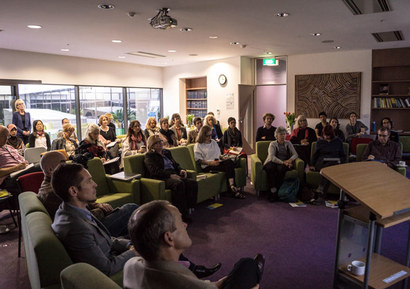
I am available to conduct workshops and present lectures that highlight the benefits of contemplation through practice and theory, to address the increasing stress and anxiety we are suffering. These presentations can also support creative and empathetic response, heighten self-awareness, and increase prosociality and emotional intelligence. To date I have lectured on contemplative law, ethics, education, acting and art in tertiary settings and conducted workshops on contemplative writing and art, self-care and care of others, and a symposium on Contemplative Education at UNSW in 2014. Recent presentations include: co-presentation on ‘translating the ineffable,’ or prefigurative experience from contemplation at Meeting of Minds: Art, Science, Technology and the Brain, Marina Abramović: In Residence Program, Sydney; co-presented on appropriate methods to engage the precognitive through contemplation at the Centre for Agency, Values and Ethics (CAVE), Macquarie University, Sydney, and lectured on contemplative art at UNSW’s School of Art and Design. The Mindfulness in education: Tools for self-care and care of others workshop, UNSW, November 2014 and the Standing still to learn, Contemplative and creative approaches to education: New paradigms in teaching and learning symposium, UNSW, May 2014.
Feedback
I have taught on a range of courses receiving good feedback - Course and Teaching Evaluation and Improvement (CATEI) responses for a Social Policy course 2012-13, UNSW were positive, with the majority of answers to all 9 questions in the top three categories ‘strongly agree’, ‘agree’, ‘moderately agree’. For example there was a 100% positive response to the question ‘This facilitator/tutor helped me to improve my ability to learn independently in the future’.
Some of the comments from this course were:
Some of the comments from this course were:
|
“She tried really hard to make the boring content fun, making us have debates and do activities that we found interesting. It helped to break up the intensity of the course and make it more interactive.” “Getting us into groups so it was easier to make friends, giving helpful feedback on assignments, she helped with assignments a lot, lots of group activities and a fun final tutorial, lots of helpful handouts” (First and Second year students, Social Policy, UNSW, 2012 – 2013).
|
Feedback from teaching on UOSS, UNSW 2012, these are some of the students’ comments:
|
“She embraced everyone’s opinion and she was nurturing”, “Interesting and great relationship”; “engaging and allowed participation” (Mark and Robert, UOSS, 2012, UNSW)
|
And this from a student who emailed after completing the first semester in 2013:
|
“Patricia, you were such a wonderful tutor. I know how much the entire class appreciated you. The university is lucky to have someone like you because not only do you have the maturity, knowledge and experience in so many areas, you also have compassion, a genuine interest in your students and the ability to communicate and listen.” (Bridget, UOSS Student, UNSW)
|
Feedback from the Meditation Lab, UNSW, Sydney, Australia 2014:
|
“I first met Patricia at a meditation and mindfulness lab she was running at UNSW. During this course Patricia taught me and other students’ different types of meditation as well as different methods of being mindful in everyday life. My favourite practice which Patricia taught in this course is Yoga Nidra which is something I still practice frequently today. I love Yoga Nidra because I can clearly see the positive influences it has on my mental wellbeing. I have in turn taught friends and family about Yoga Nidra and many of them practice Yoga Nidra often as well. They too see benefits to their wellbeing, such as an increased ability to focus for longer timeframes. Yoga Nidra is not something that I have seen advertised at yoga studios in Australia and overseas, thus I am extremely grateful to Patricia for introducing me to the practice.” (Andrea, 3rd year Accounting student)
|
Feedback from my presentation on ‘Contemplative Art’, 2015, Rhode Island School of Design, Providence, Rhode Island, USA:
|
“The contemplative practices lead by Patricia last week allowed for a momentary self-awareness and a temporary shift in focus towards inner reflection. Although I had had some expectations beforehand, they did not prove to be constraining in the result of the practice. I found the experience most restful and effective in shifting my awareness to the imperceptible. It was incredible to be able to become acutely aware of the sensitivity of minute muscles movements, and even more ambiguously, of the tingling ‘aura’ that seemed to expand and create a personal space. I particularly enjoyed the peculiarity of the sensation that my individual space could not be infringed upon by others, and that in that moment, all task-driven thoughts could be forgotten. Momentarily, it was wonderful to be able to drift through a somewhat indiscernible space and to be able to enjoy the simple pleasure of ambiguity and muted thoughts.” (Jess, 2nd year Design Student, RISD)
|
For the complete details of my teaching, research, invited lectures and workshops please see my attached CV. If you are interested in contracting me for research, mentoring, teaching or presentations on Contemplative Education please contact me here.
Curriculum Design
Through the Contemplative Academy I offer contemplative curricula and the design of contemplative orientations for institutions.
Contemplative Curriculum
I can design curriculum based on your institutional culture and the needs of your students in a wide range of disciplines. This will include suggestions for assessment and delivery across the life of a course of study. To date I have lectured in Contemplative Education, the School of Education, University of Western Sydney (UWS) and for the Teaching and Curriculum Unit, University of Wollongong; Contemplative Law, the School of Law, UNSW; Mindful Leadership, UNSW; Contemplative Ethics, Australian Catholic University (ACU); Contemplative Methodology at the Centre for Agency, Values and Ethics (CAVE), Macquarie University; Contemplative Acting, the International Screen Academy, Sydney; Contemplative Art at both the Rhode Island School of Design and UNSW Art and Design; Contemplative Writing, the Heaven and Earth Writers Festival, and Somatic Knowing Revealed Through Contemplative Practice, the School of Gender and Cultural Studies, University of Sydney. These lectures provide the framework for curricula in these areas.
In addition I have developed curricula in Reflective Practice, Contemplative Practice, Theology and Environmental Art, and Contemplative Art. What follows is a brief overview of these curricula, which are currently available, support in the first semester’s use of this curricula is offered, including suggested contemplative practices for student and staff and advice on assessment:
In addition I have developed curricula in Reflective Practice, Contemplative Practice, Theology and Environmental Art, and Contemplative Art. What follows is a brief overview of these curricula, which are currently available, support in the first semester’s use of this curricula is offered, including suggested contemplative practices for student and staff and advice on assessment:
REFLECTIVE PRACTICE
“New Understandings of Reflection in Professional Practice: Theory and Applications”
This 13 week, 6 credit, General Education course is suitable for both graduates and undergraduates (with some adjustments)
Overview of the Course:
This course provides students with the reflective skills that are vital for study and increasingly being required by employers. It highlights the parallel development of discipline specific (hard skills) and interpersonal competencies (soft skills), their interconnection and the centrality of reflection for both. The course builds on current understandings of reflection through its consideration of the place of first, second and third person experience in professional reflective practice. It starts with an introduction to the ‘phenomenology of reflection’ and process philosophy; the two central theoretical platforms of the course. They are important in any examination of reflection in action as they provide the means to understand both: self-awareness the basis of reflection, and the ecologies or processes that frame any application of our reflections. This development of a theoretical understanding of reflection then grounds applied approaches as we examine a series of case-studies that illustrate the central premise of the course. This is the proposition that a familiarity with our subjective realities is essential in the development of sound reflective skills. On the completion of the course students will have a comprehensive understanding of the links between reflection, self-awareness and employability. This is framed by an awareness of the levels of experience that ground real world reflective experience; a familiarity with central philosophical themes in this area, and an appreciation of reflective professional practice.
This 13 week, 6 credit, General Education course is suitable for both graduates and undergraduates (with some adjustments)
Overview of the Course:
This course provides students with the reflective skills that are vital for study and increasingly being required by employers. It highlights the parallel development of discipline specific (hard skills) and interpersonal competencies (soft skills), their interconnection and the centrality of reflection for both. The course builds on current understandings of reflection through its consideration of the place of first, second and third person experience in professional reflective practice. It starts with an introduction to the ‘phenomenology of reflection’ and process philosophy; the two central theoretical platforms of the course. They are important in any examination of reflection in action as they provide the means to understand both: self-awareness the basis of reflection, and the ecologies or processes that frame any application of our reflections. This development of a theoretical understanding of reflection then grounds applied approaches as we examine a series of case-studies that illustrate the central premise of the course. This is the proposition that a familiarity with our subjective realities is essential in the development of sound reflective skills. On the completion of the course students will have a comprehensive understanding of the links between reflection, self-awareness and employability. This is framed by an awareness of the levels of experience that ground real world reflective experience; a familiarity with central philosophical themes in this area, and an appreciation of reflective professional practice.
CONTEMPLATIVE EDUCATION
“Contemplative Education: Pedagogical Applications of Contemplative Theory and Practice”
This 15 week course is suitable for graduates and undergraduates; it can also be run in the co-curricula or continuing education space (with some adjustments)
Overview of the Course:
This course examines the current re-emergence of contemplative education, and its implications for pedagogy in formal and non-formal settings including health care and community development spaces. Using an interdisciplinary approach it examines implications of contemplative education’s history, the politics of the contemplative and subjective, the understanding of contemplation as an embodied practice, the place of contemplation in religious and secular education. It explores both a range of contemplative practices presently used in education, and relations between spiritual, transformative, integral, and contemplative education to highlight ethical implications, and a framework for pedagogy that is congruent with the contemplative. The focus on theory and practice in this course provides opportunities for participants to enrich their personal and professional lives while examining the role of contemplative educators, and the development of contemplative pedagogy.
This 15 week course is suitable for graduates and undergraduates; it can also be run in the co-curricula or continuing education space (with some adjustments)
Overview of the Course:
This course examines the current re-emergence of contemplative education, and its implications for pedagogy in formal and non-formal settings including health care and community development spaces. Using an interdisciplinary approach it examines implications of contemplative education’s history, the politics of the contemplative and subjective, the understanding of contemplation as an embodied practice, the place of contemplation in religious and secular education. It explores both a range of contemplative practices presently used in education, and relations between spiritual, transformative, integral, and contemplative education to highlight ethical implications, and a framework for pedagogy that is congruent with the contemplative. The focus on theory and practice in this course provides opportunities for participants to enrich their personal and professional lives while examining the role of contemplative educators, and the development of contemplative pedagogy.
THEOLOGY AND ENVIRONMENTAL ART
“Transcendental Unity and Incarnational Spirituality in Contemplative Environmental Art and Ritual”
This 15 week, 6 credit course is suitable for graduates and undergraduates (with some adjustments, and change in course length)
Overview of the Course
This course explores the intersection of Yoga and Christian Mysticism through their shared goal of transcendental unity (unio mystica) or the direct experience of God. Using both theoretical and applied means it critically examines experience of this state in contemplative environmental art and ritual, which uses practices drawn from these mystical systems. The course is divided into two sections, the first surveys the historical roots of the emergence of a Christian Yoga, including the influence of the American transcendentalists and the dialogue between Christian and Yogic mystics. Then in an interdisciplinary exploration, focused through phenomenology, it critically examines transcendental unity, relating understandings of this ecological or interrelational state of consciousness to questions about the embodied nature of contemplative environmental art practices. The second section, resting on the understanding of the contemplative state as one that can reveal the ecologies of practitioner, place, and practice, engages interdisciplinary propositions to explore the way in which alternative spiritual practices are reinvigorating contemporary Christianity. In its engagement with eco-theology, eco-phenomenology, environmental philosophy, and neurophenomenology, this course outlines how contemplative creative experience has implications for personal spiritual practice, ministry, community development, and environmental activism.
This 15 week, 6 credit course is suitable for graduates and undergraduates (with some adjustments, and change in course length)
Overview of the Course
This course explores the intersection of Yoga and Christian Mysticism through their shared goal of transcendental unity (unio mystica) or the direct experience of God. Using both theoretical and applied means it critically examines experience of this state in contemplative environmental art and ritual, which uses practices drawn from these mystical systems. The course is divided into two sections, the first surveys the historical roots of the emergence of a Christian Yoga, including the influence of the American transcendentalists and the dialogue between Christian and Yogic mystics. Then in an interdisciplinary exploration, focused through phenomenology, it critically examines transcendental unity, relating understandings of this ecological or interrelational state of consciousness to questions about the embodied nature of contemplative environmental art practices. The second section, resting on the understanding of the contemplative state as one that can reveal the ecologies of practitioner, place, and practice, engages interdisciplinary propositions to explore the way in which alternative spiritual practices are reinvigorating contemporary Christianity. In its engagement with eco-theology, eco-phenomenology, environmental philosophy, and neurophenomenology, this course outlines how contemplative creative experience has implications for personal spiritual practice, ministry, community development, and environmental activism.
CONTEMPLATIVE ART
- “Contemplative Art: Creativity from the Inside Out"
Overview of the Course:
This course employs contemplative practice and theory to examine the concept of direct seeing, where thoughts about one’s art-making are released so that a deeper and possibly more authentic experience or ‘seeing’ is engaged. Participants will develop new understandings of creativity and critique their contemplative art practice through reflection on the work of contemporary and ancient contemplative artists. They will progress through central contemplative art practices, reflecting on their work in relation to concerns of early Tantric and Taoist Artists, Visionary and Spiritual Artists and members of the Dada inspired Process Art Movement. Working at this intersection of art-making, theory and contemplative practice participants’ subjective experience will become the experimental site focusing course outcomes.
CONTEMPLATIVE PHOTOGRAPHY, Dr Erika Scilipoti
“Seeing Through the Lens”
This 12 week course is suitable for undergraduates and graduates, and can be run in the co-curricula or continuing education space (with some adjustments)
Overview of the Course:
In this course students are guided through an exploration of mindfulness using photography. This includes an examination of the relationship between the contemplative state of mind - of clear and nonconceptual awareness and the creative experience through photography. This course is grounded in the understanding that the process of selecting what to record depends upon one’s state of awareness and the photographer’s connection with the present moment. In this way photography becomes a practice of mindfulness meditation. The topics covered in this course include: histories of mindfulness and photography, approaches to creativity and the empty mind, an introduction to reality and selection, space and time, illusion and ambiguity. Relevant aspects of visual perception and design principles frame these topics and are taught throughout the course
This 12 week course is suitable for undergraduates and graduates, and can be run in the co-curricula or continuing education space (with some adjustments)
Overview of the Course:
In this course students are guided through an exploration of mindfulness using photography. This includes an examination of the relationship between the contemplative state of mind - of clear and nonconceptual awareness and the creative experience through photography. This course is grounded in the understanding that the process of selecting what to record depends upon one’s state of awareness and the photographer’s connection with the present moment. In this way photography becomes a practice of mindfulness meditation. The topics covered in this course include: histories of mindfulness and photography, approaches to creativity and the empty mind, an introduction to reality and selection, space and time, illusion and ambiguity. Relevant aspects of visual perception and design principles frame these topics and are taught throughout the course
A CONTEMPLATIVE ORIENTATION:
I am available to design contemplative orientations for institutions. Institution-wide development of a contemplative orientation entails many facets; these include but are not limited to:
- Pre-application research in which readiness for this approach is gauged and suggestions gathered from staff and students, these suggestions are then integrated into the plan.
- Integration of aligned approaches such as positive psychology, prosociality, and emotional intelligence – linking with employers’ calls for greater ‘soft skills’ in graduates.
- Appropriate ongoing staff and student training in contemplative practice (CP), including regular retreats.
- A holistic approach that draws from both the Natural and Human Science, which addresses body, mind, emotions and spirit.
- Identifying relevant links between CP, pedagogy and philosophy, and institutional culture.
- Links made with international contemplative institutions and practitioners
- Research conducted to provide evidence for continuation of the initiative.
- Matching institutional aims and vision with those of Contemplative Education and Philosophy
- Correct pacing of the integration of contemplative studies and pedagogy in curriculum and the co-curricular space, across courses of study, in addition to the development of suitable assessment.
- Forming alliances with relevant community groups and industry
- Reflection on the ethics of care needed with contemplative pedagogy
FUTURE CURRICULA:
I am currently working with colleagues to develop contemplative curricula in Mathematics and Statistics, Marketing, Fine Arts, Law, Educational Philosophy and Yogic Studies; these courses should be available in the new year.
Please contact me if you would like to discuss the design of a contemplative orientation in your organization, or to commission curriculum. Visit the Contacts Page here.


